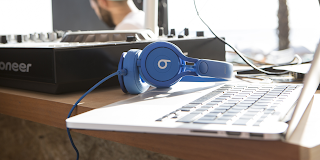 Day by day the advancement of
technology is getting bettered. Now a days softwares have almost taken places
of djing style and its performing better than the traditional somehow. It's
good and its a known status of act. There's not much to bother about it.
Currently the technical sides of djing i.e beat matching, mixing, looping,
composing...are mostly done by a software outsourced to computer. Then why
beatmatching, mixing etc..are called skills? The reliable fact is that skill
belongs to human and software belongs to computerized devices. Though it seems
virtually impossible to inculcate skill into the brain of computer but
considering the healthy goodness of this electronic generation there's a lot to
develop in computers for the futuristic peachiness.
Day by day the advancement of
technology is getting bettered. Now a days softwares have almost taken places
of djing style and its performing better than the traditional somehow. It's
good and its a known status of act. There's not much to bother about it.
Currently the technical sides of djing i.e beat matching, mixing, looping,
composing...are mostly done by a software outsourced to computer. Then why
beatmatching, mixing etc..are called skills? The reliable fact is that skill
belongs to human and software belongs to computerized devices. Though it seems
virtually impossible to inculcate skill into the brain of computer but
considering the healthy goodness of this electronic generation there's a lot to
develop in computers for the futuristic peachiness.
Dj sets are not fixed and track
selection changes from venue to venue. Different crowd influences different
cities, festivals, nightlife. How a computer can well be adjusted with this
versatility in djing? Computer acts according to commands. In a festival there
will be thousands of commands. Can a computer remember all the commands at a time?
Can a computer react to the emotionality of crowd? You cannot expect a
particular one scene in djing. It will change inconsistently and its not
possible for computer to set a new standard every while. While to maintain the
computer programming here an IT specialist required more than a dj, because its
all about programming, not music. It's more as a task not as a play.
Some people may think about automix
here. But automix cannot serve upto our interest and its just a controlled
force of what a particular computer thinks. If computers are developed with the
flexibility of crowd choices then at least 70% problems in modern djing would
be solved. Again when a dj is playing his/her set from crowd prospective he/she
has to be active by ears/mind. Catching the attraction of crowd is not easy as
easy as it feels to say. It takes a longtime to develop this skill and by playing
a lot of sessions somehow its helpful to understand the crowd from a live
impact.
Some may even think about developing
a crowd feedback system by which a person can show his/her like or dislike for
a particular track. Isn't its too stressful. May it seems to be an easygoing in
initial stage but as a real clubber one going to feel heck as a clubber to do
it continuously. Clubbers want to feel the tune, music they are there for
enjoyment not to perform tasks. More or less this activity will seem like a
task and its not good in long run. The clubbers emotion will tell all the
things which track is peaky and which one feels down. Accordingly the dj
changes the track simultaneously with the nonverbal clue. This is where a dj
can setup the tone, which computer can't do.
Computers can match genre, tempo, up
and down pitches of sound, recording limitless data, but it can’t control the
change of data sequence which djs now a days do. Being the centre of concept, a
dj understands the culture out there in a live mode and he/she manages the up
and down of pitches, and change of track selection. Being a well known divine
listener of music a dj is there in the club/festival to perform for his crowd
for a particular time and creating a musical journey with the evolvement of
moods and involvement of emotion on behalf of the partygoers or dance groovers.
The root of dj culture is nothing but a collective performance of an equality
of respect between the crowd and dj. It's possible with the help of good
understanding, not a peach programming.

